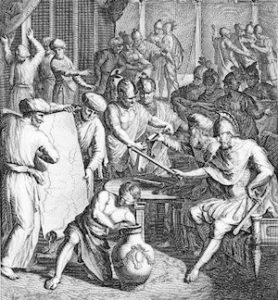 Joshua and Eleazar continue to assign territories to the twelve tribes by casting lots at Gilgal. They are fulfilling the instructions given by Moses:
Joshua and Eleazar continue to assign territories to the twelve tribes by casting lots at Gilgal. They are fulfilling the instructions given by Moses:
Numbers 34:13 13 So Moses commanded the sons of Israel, saying, “This is the land that you are to apportion by lot among you as a possession, which the LORD has commanded to give to the nine and a half tribes.
We don’t know all the details of how decisions are made by casting lots, but the first example we have in Scripture is when Aaron, the High Priest, cast lots to determine which of the two goats on the Great Feast of Atonement would be chosen to be sacrificed as a sin offering, and which one would be led into the wilderness as a scapegoat. The goat, slain as an offering, pictured the Godward side of the atonement (called ‘propitiation’- the satisfaction of God’s justice). The goat that was led by ‘a fit man’ far away into the wilderness represented the manward side of the Atonement (called ‘expiation’- the removal of guilt from our account and conscience, ‘as far as the east is from the west’; Psalm 103:12).
Eleazar, like Aaron, was a priest and would have had two stones, the Urim and the Thummin, in a pouch beneath his breastplate. These stones would be used in some way to determine the will of the Lord. In some cases, decisions were made by casting lots, like dice. But this is not God’s chosen means today, in the age of the Holy Spirit.
Proverbs 16:33 33 The lot is cast into the lap, but its every decision is from the LORD.
Ephraim and Manasseh were the sons of Joseph and were adopted by Jacob, who blessed them as if they were his own sons (Genesis 48:15-22).
When Jacob blessed the younger Ephraim, we saw the continuation of a pattern in the Bible. The natural firstborn, by God’s sovereign doing, is superseded by the second. Jacob gave his blessing to the second-born Ephraim rather than the first-born Manasseh, saying that Ephraim will be greater. This is a spiritual principle- first comes that which is natural, our first birth, in Adam. Then comes that which is spiritual, our second birth, in Christ (See 1 Corinthians 15:46). This is a spiritual anomaly. Naturally speaking, the firstborn has the birthright. But God is showing that He will intervene history in a special way to accomplish His Sovereign purpose.
The tribe of Levi did not get an inheritance in the land, as they were allotted their place of service in the cities and the tabernacle. So, splitting the inheritance of the household of Joseph into two (the tribes of sons Ephraim and Manasseh) meant that there still would be twelve tribes overall getting their portions in the land.
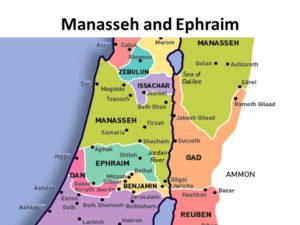 Although the tribe of Manasseh did not get the blessing of the firstborn, they certainly received plenty of territory on both sides of the Jordan.
Although the tribe of Manasseh did not get the blessing of the firstborn, they certainly received plenty of territory on both sides of the Jordan.
You may remember that the tribes of Reuben, Gad, and half the tribe of Manasseh requested to settle east of the Jordan River because they found that the land was suitable for their livestock (Numbers 32:16-17). This is why there would be only 9 ½ tribes west of the Jordan. Moses said that this request would be honored if their men joined with the rest of the tribes in the conquest of the land to the west. This they did, proving to be great warriors (Josh 17:2). The men of these tribes kept their promise in helping their brothers in the conquest of Canaan east of the Jordan.
Joshua will commend them for their faithful service in the campaign in Chapter 22:1-4.
Joshua 22:1-4 1 Then Joshua summoned the Reubenites and the Gadites and the half-tribe of Manasseh, 2 and said to them, “You have kept all that Moses the servant of the LORD commanded you, and have listened to my voice in all that I commanded you. 3 “You have not forsaken your brothers these many days to this day, but have kept the charge of the commandment of the LORD your God. 4 “And now the LORD your God has given rest to your brothers, as He spoke to them; therefore turn now and go to your tents, to the land of your possession, which Moses the servant of the LORD gave you beyond the Jordan.
Although Manasseh’s territory was larger than Ephraim’s territory, it was Ephraim’s land that was perhaps the most desirable in the promised land. It was known for its beauty and fertility. The history of Ephraim, however, is a sad one. In the future, the prophet Hosea will use Ephraim as an example of unfaithfulness, mentioning ‘Ephraim’ 37 times in a negative light, showing how they accommodated the idolatry of the nations. The failure of this tribe begins here as they fail to drive out the Canaanites.
Joshua 16:10 10 But they did not drive out the Canaanites who lived in Gezer, so the Canaanites live in the midst of Ephraim to this day, and they became forced laborers.
The examples of the 12 tribes are for our instruction. They warn us who have believed God and have received our inheritance in Christ that we can still fail to appropriate all that is ours in Christ. How can this be? If we are passive, indifferent, or complicit with the enemies that war against our souls— the world, the flesh, and the devil—we are sure to fall short of our call to fruitfulness. (Remember ‘Ephraim’ meant ‘fruitful’.)
Jesus said to his disciples:
John 15:16 16 “You did not choose Me but I chose you, and appointed you that you would go and bear fruit, and that your fruit would remain, so that whatever you ask of the Father in My name He may give to you.
Another reason God’s chosen people can fail to be fruitful is prayerlessness. Do we abide in Christ and boldly ask the Father for that which would bring glory to His Name and blessing to the lives of others?
We sometimes fail to experience the fullness of what is ours in Christ because we want an easy life. We don’t like conflict. We would prefer not to have to drive out the enemy, thinking that we can resist him passively.
Campbell Morgan writes: “The gifts of God to His people belong to them because He bestows them; but they can only be really possessed by conflict, and thus by the action of those upon whom they are bestowed. …To fail to appropriate Divine gifts by conflict against enemies, is to lose them. The things that are ours by Divine grace, we must make ours by our own devotion.” (Searchlights from the Word, p. 68)
In Joshua 17, we meet the daughters of Zelophehad once again. Remember, Zelophehad, who was of the tribe of Manasseh, had no sons, so his daughters made a plea for an allotment of territory upholding their deceased father’s right of inheritance in the Promised Land (Numbers 27:1-11). Like the daughter of Caleb, these women demonstrated a strong faith, and were forthright in claiming God’s promises and making known their requests!
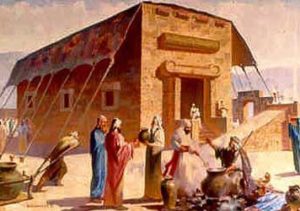 We see in these chapters that Joshua is not just a bold military leader; he is a wise administrator and godly leader. The tribes of Manasseh and Ephraim complain about their allotted portions and complain to Joshua that they deserve better. They reminded Joshua that he too was from the great tribe of Ephraim (Numbers 13:8). Should not they be given greater consideration? Joshua responds, saying in effect, “If you are so great, why don’t you get out to your mountains and forests and clear the land you have been given?” He reminded them that what they were given was indeed full of potential. There is a way to enlarge your borders by extending your occupiable land within! Fulfill your assignment!
We see in these chapters that Joshua is not just a bold military leader; he is a wise administrator and godly leader. The tribes of Manasseh and Ephraim complain about their allotted portions and complain to Joshua that they deserve better. They reminded Joshua that he too was from the great tribe of Ephraim (Numbers 13:8). Should not they be given greater consideration? Joshua responds, saying in effect, “If you are so great, why don’t you get out to your mountains and forests and clear the land you have been given?” He reminded them that what they were given was indeed full of potential. There is a way to enlarge your borders by extending your occupiable land within! Fulfill your assignment!
In Chapter 18 the Tabernacle is set up in Shiloh, about 25 miles north of Jerusalem, where it will remain for about 300 years through the period of the Judges where it will eventually be captured by the Philistines. David will rescue it one day and bring it to Jerusalem.
Seven tribes are slow to take possession of the land, so Joshua initiates a new plan to inspire them to take action. He sends out three men from each tribe to write a description with a view to their inheritance. They would list the cities, describe the landmarks, and note the distinctive features of each territory. Joshua would divide the land, and they would describe it. Then Joshua (and Eleazar?) would cast lots for it before the Lord.
A good leader will get others involved in seeing the possibilities in the future. He will encourage them to experience the fullness of what God has promised.
Since Benjamin was a full brother to Joseph, both having Rachel as their mother, the tribe of Benjamin is given territory next to Ephraim and Manasseh.
NEW TESTAMENT READING: LUKE 19:1-27
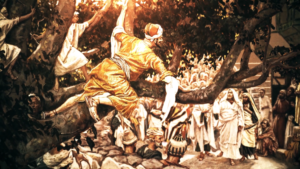 Not only does Jesus meet and heal blind Bartimaeus as he comes to Jericho, but it is in Jericho that he calls Zacchaeus, the chief tax collector, to come down from the sycamore tree where he was trying to get a good look at Jesus. He gets more than a good look, He gets salvation. Jesus invites Himself to stay at Zacchaeus’ house.
Not only does Jesus meet and heal blind Bartimaeus as he comes to Jericho, but it is in Jericho that he calls Zacchaeus, the chief tax collector, to come down from the sycamore tree where he was trying to get a good look at Jesus. He gets more than a good look, He gets salvation. Jesus invites Himself to stay at Zacchaeus’ house.
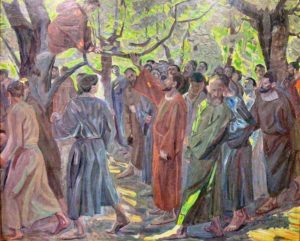 On Jesus’ final journey to Jerusalem, we see a contrast in people’s responses to him. He met at least two rich men at Jericho–the rich religious ruler and Zacchaeus. One went away sorrowing, the other welcomes Jesus joyfully. One could not give up what he had. One gave away half of what he had. One sought salvation through his own works of righteousness-the other found salvation in the person of Jesus. One remained unchanged. The other was so transformed by the salvation he found in Jesus that he gave away half of his goods and restored those he cheated in the past, 4 times the amount he had swindled from them. Jesus commends Zacchaeus as a bonafide son of Abraham because He put his faith in God’s promise- a Living Savior.
On Jesus’ final journey to Jerusalem, we see a contrast in people’s responses to him. He met at least two rich men at Jericho–the rich religious ruler and Zacchaeus. One went away sorrowing, the other welcomes Jesus joyfully. One could not give up what he had. One gave away half of what he had. One sought salvation through his own works of righteousness-the other found salvation in the person of Jesus. One remained unchanged. The other was so transformed by the salvation he found in Jesus that he gave away half of his goods and restored those he cheated in the past, 4 times the amount he had swindled from them. Jesus commends Zacchaeus as a bonafide son of Abraham because He put his faith in God’s promise- a Living Savior.
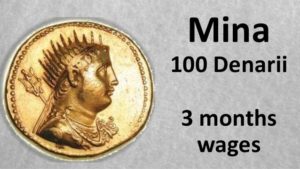 Jesus gives a parable that reflects Who He is as Israel’s Master and hope. He describes a nobleman who calls his servants into a relationship with Himself in which they are given special privileges. He asks each one to invest what he gives them, a certain amount of money, known as a mina. The parable parallels what Jesus has been teaching about the delay of His return to set up His kingdom. He is coming back again. He will return as Judge, and all must give an account, especially those to whom He delegated responsibility (his servants, such as Israel).
Jesus gives a parable that reflects Who He is as Israel’s Master and hope. He describes a nobleman who calls his servants into a relationship with Himself in which they are given special privileges. He asks each one to invest what he gives them, a certain amount of money, known as a mina. The parable parallels what Jesus has been teaching about the delay of His return to set up His kingdom. He is coming back again. He will return as Judge, and all must give an account, especially those to whom He delegated responsibility (his servants, such as Israel).
Verse 14, however, does not just reflect the rebellion that was found in many in Israel, but in the heart of unregenerate man:
Luke 19:14 14 “But his citizens hated him and sent a delegation after him, saying, ‘We do not want this man to reign over us.’
When the nobleman returns, he is not just a nobleman; He is King. He calls his servants to give an account. Those who were faithful with what they were given are not only commended, they are rewarded. However, the man who had no respect for the nobleman he was called to serve buried his mina. Perhaps he was intimidated by the slander of the citizens and believed their false reports. He had no faith in his master’s good will, or that he would return, although he held a position as his servant. This is a warning to those who have been given the privilege of God’s Word. We need to steward the gospel revelation faithfully. Don’t presume to have a right relationship with the King if you don’t honor Him with trust. This man suffers loss. And those who would not have this man to rule over them will experience divine retribution.
TODAY’S READING FROM THE BOOK OF PSALMS
PSALM 87
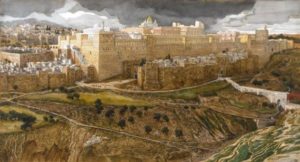 The Psalmist sings of the city of God, Jerusalem. The city represents God’s promise. Indeed, God chose Jerusalem to be the center stage in the drama of redemption. It is there that Jesus would be crucified, buried, and raised. It would be from the Mount of Olives, outside the city gates, where Jesus ascended and where He will return to reign. And of His kingdom there will be no end.
The Psalmist sings of the city of God, Jerusalem. The city represents God’s promise. Indeed, God chose Jerusalem to be the center stage in the drama of redemption. It is there that Jesus would be crucified, buried, and raised. It would be from the Mount of Olives, outside the city gates, where Jesus ascended and where He will return to reign. And of His kingdom there will be no end.
So, when the Psalmist sings of the city of God, he is singing of the consummation of all the purposes of God, and His wondrous gift of salvation.
When we are born again, we are made citizens of heaven, heirs of God, and joint-heirs with Jesus.
Psalm 87:5 5 But of Zion it shall be said, “This one and that one were born in her”; And the Most High Himself will establish her.
When the Psalmist sings the last verse, it is not of a city made with hands that he sings, but a city whose builder and maker is God, and the Lord who is the light of the city.
Psalm 87:7 7 Then those who sing as well as those who play the flutes shall say, “All my springs of joy are in you.”
TODAY’S PROVERB- ANOTHER REMINDER OF THE BLESSING OF GOOD, HONEST HARD WORK
Proverbs 13:11 11 Wealth obtained by fraud dwindles, But the one who gathers by labor increases it.
Once again we are shown the wisdom of good, honest, hard work and the assurance that wealth obtained by deceit will eventually disappear.
PRAYER: Father, there is much to learn in these passages about stewardship. Forgive us for complaining about our allotment. Help us to develop what You have given us to the fullest potential. Help us to honor You with the revelation, the time, the talents, and the gifts You have given us. We do not take these privileges lightly. We do not despise Your gifts. We rejoice that You have made us fellow-citizens in Your forever city. May we sing and shout Your praises. May all that flows forth from my life be to the praise of Your glory. In Jesus’ Name. Amen
Pastor David
